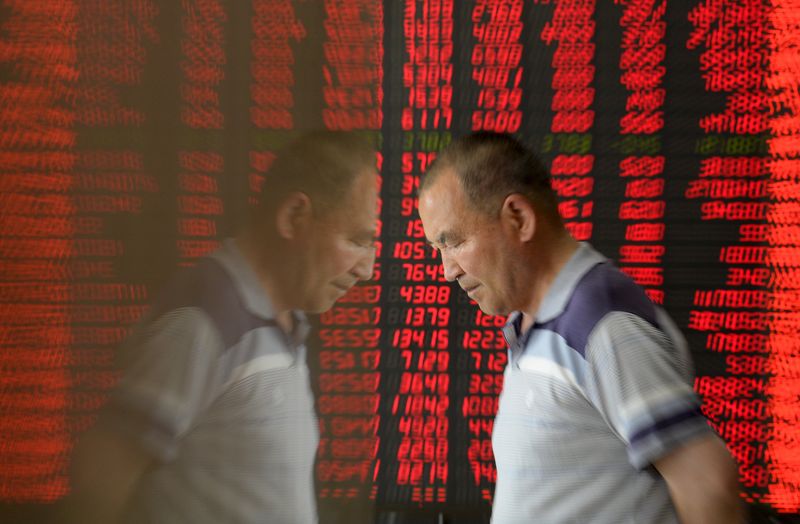By Wayne Cole
SYDNEY (Reuters) - Asia shares sank in a sea of red on Tuesday as speculation of U.S. rate rise as early as September hit emerging markets generally, while failing to give a lasting lift to the dollar.
A steady start soon gave way to broad selling with MSCI's index of Asia-Pacific shares outside Japan (MIAPJ0000PUS) shedding 0.8 percent to a fresh 10-week low.
Indonesian stocks (JKSE) led the way with a drop of over 3 percent, while the Philippines (PSI) shed 2.1 percent and Japan's Nikkei (N225) 0.8 percent. The losses were a boon to sovereign bonds as risk aversion boosted prices for Japanese, Australian and U.S. debt.
China reported another soft reading on inflation as the consumer price index slipped 0.2 percent in May from the month before, putting annual inflation at 1.2 percent.
The tame inflation figures fed expectations that Beijing will add more policy stimulus. Investors were still unnerved by this symptom of weak demand and their selling pulled stocks away from seven-year highs. The Shanghai (SSEC) and CSI300 indices (CSI300) were both off 1/2 percent.
Investors were also waiting nervously to see if MSCI will add Chinese shares to its global index. An announcement is due later Tuesday on whether MSCI will include China 'A' shares in its Emerging Markets Index, either partially or in full.
Analysts at HSBC estimate a partial inclusion of China A shares would lead to passive inflows of around $3 billion, while a full inclusion could see demand worth at least $47 billion.
The addition of China would likely hurt markets in Korea, Taiwan, and India in terms of index weights and flows, they added.
Europe's biggest bank, HSBC Holdings (HK:0005) (L:HSBA), confirmed weeks of speculation by announcing cost cuts of up to $5 billion and the loss of up to 25,000 jobs in an effort to improve its sluggish performance.
On Wall Street, the Dow (DJI) had ended Monday down 0.46 percent, while the S&P 500 (SPX) lost 0.65 percent and the Nasdaq (IXIC) 0.92 percent.
Apple (O:AAPL) weighed most on the Nasdaq Composite and the S&P 500. It was down 0.66 percent after the iPhone maker unveiled a new music service.
There was the usual caution over Greece where interminable debt talks showed no sign of ending soon.
The Greek government did say it was ready to negotiate a settlement acceptable to both sides by the end of this month, just three days after Prime Minister Alexis Tsipras told his parliament the latest proposal from the EU and IMF was "absurd".
Yet there was no new proposal from Athens that its creditors could agree to, an EU official said.
There was better news from Germany where industrial output beat expectations and helped ease fears of deflation.
Yields on German 10-year paper (DE10YT=RR) climbed to 0.89 percent, while those on 10-year Treasuries (US10YT=RR) dipped to 2.37 percent in Asia. As a result the premium offered by U.S. debt narrowed to around 148 basis points, having been as wide as 190 back in March.
The dollar also took a hit from reports President Barack Obama had called the high currency a problem in talks at the G7, though the White House later denied he had ever said it.
Federal Reserve and other officials have expressed concerns about dollar strength's impact on growth and exports.
The euro benefited from the dollar's pullback, rising to $1.1314
The dollar index (DXY) dipped 0.22 percent to 95.090 having shed 1.1 percent on Monday.
In commodity markets, oil steadied after being hit by a slump in Chinese demand and worries that OPEC's decision to pump crude without restraint could prolong the current supply glut.
U.S. crude futures

Gold gained on the softer dollar to reach $1,175.88 an ounce